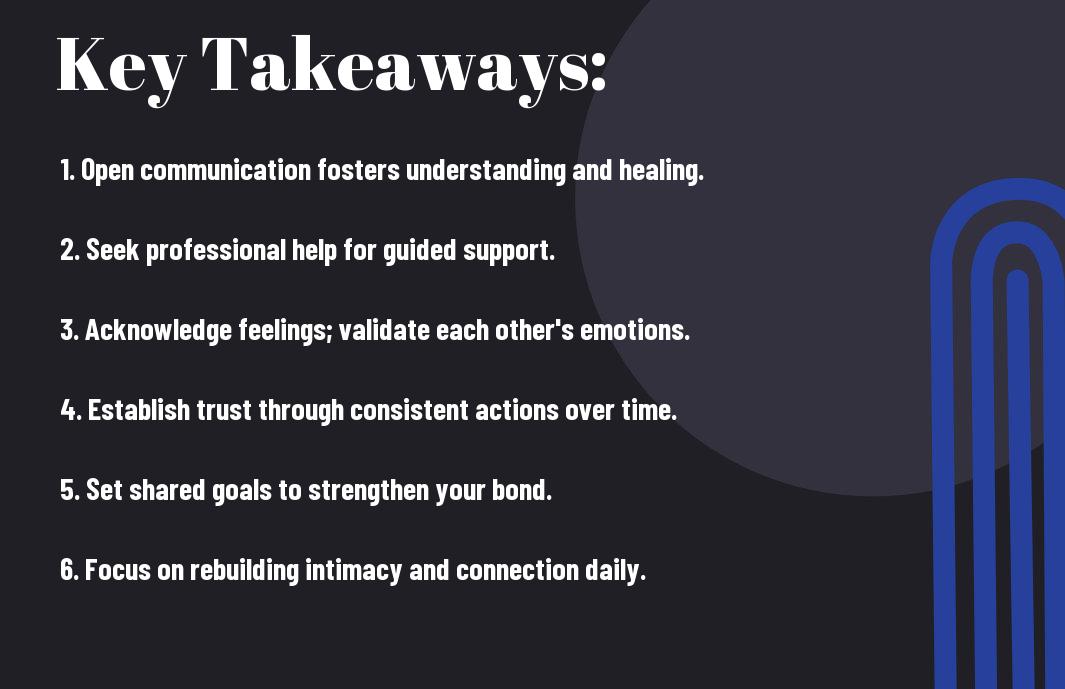Just facing the aftermath of infidelity can feel overwhelming, but recovery is possible if both partners are willing to put in the effort. To rebuild trust and communication, you must actively engage in open dialogues and prioritize healing. This post will guide you through the vital steps you can take to not only recover from betrayal but also strengthen the bond with your partner. With determination and commitment, you can transform this challenging experience into an opportunity for growth and a more resilient marriage.

Key Takeaways:
- Open and honest communication is crucial to address feelings, concerns, and expectations post-infidelity.
- Both partners should take responsibility for their roles in the relationship, fostering an environment of accountability.
- Establishing boundaries and setting clear guidelines can help build trust and security moving forward.
- Consider seeking professional help through couples therapy to navigate complex emotions and gain guidance.
- Give each other time and space to heal, understanding that recovery is a gradual process.
- Focus on rebuilding the emotional connection through shared experiences and quality time together.
- Prioritize forgiveness and let go of resentment for lasting healing and growth within the relationship.


Understanding Infidelity
For many, infidelity can be a shocking betrayal that shakes the foundation of a relationship. Understanding the complexities behind infidelity is necessary for recovery and rebuilding. It involves not only acknowledging the act itself but also exploring the emotional, psychological, and relational factors that contributed to it. By gaining insight into what led to this choice, you can better address the issues at hand and work towards healing.
Types of Infidelity
For you to comprehend the depth of infidelity, it’s helpful to distinguish among various types. These can include emotional affairs, physical affairs, and online infidelities. Each form can affect your marriage differently.
- Emotional Affairs – Involves deep emotional connections with someone outside your marriage.
- Physical Affairs – Involves sexual relations outside your primary relationship.
- Online Infidelity – Engaging in romantic or sexual conversations online.
- One-Night Stands – Involves brief physical encounters without emotional attachment.
- Serial Affairs – Involves multiple partners over time, often repeating the cycle.
Recognizing the type of infidelity that occurred will help you navigate the path toward recovery.
Reasons Behind Infidelity
On your journey to understanding infidelity, it’s vital to examine the underlying reasons that may have driven your partner to stray. Various factors such as unmet needs, lack of communication, or emotional distance can contribute to this complex situation.
Also, understanding the reasons behind infidelity involves looking at personal and relational dynamics. Often, people engage in infidelity due to feeling unappreciated or neglected within their marriage. External factors such as stress or life changes might trigger desire for validation outside the marriage. It’s necessary to approach these reasons without blame but rather with an understanding that both partners can learn and grow from this experience.
The Immediate Aftermath
If you’ve recently discovered infidelity in your relationship, the immediate aftermath can feel overwhelming. Emotions swirl and clarity can be hard to find. It’s necessary to take a step back, allow yourself to feel, and recognize that this process is complicated. Both partners may experience a range of feelings including betrayal, anger, and confusion. During this time, navigating the ensuing chaos with understanding and openness may lead to healing and ultimately strengthening your bond.
Emotional Reactions
One of the first things you might notice are the intense emotional reactions that surface after infidelity. You may feel a mix of shock, sadness, and even anger. Allowing these emotions to manifest can be overwhelming, but acknowledging them is a significant step toward healing and understanding where both you and your partner stand.
Communication Strategies
To navigate the complex feelings that arise, developing effective communication strategies is necessary. Open dialogue allows both partners to express their feelings without fear of judgment, fostering understanding and empathy.
Hence, it is important to create a safe space for conversations. Establish ground rules such as no interruptions and allow each other to speak freely about your feelings. Approach the discussions with an attitude of curiosity instead of blame, focusing on understanding each other’s perspectives. Set aside dedicated times to talk, and prioritize expressing your emotions honestly but respectfully. Engaging with an open heart can facilitate deeper connection, helping you both to process the hurt and ultimately work towards a healthier, more resilient marriage.
Rebuilding Trust
Once again, trust must be carefully reconstructed after infidelity. This process requires consistent effort from both partners, as trust doesn’t return overnight. You will need to cultivate a space where open communication thrives, and both of you feel safe expressing your feelings and concerns. Acknowledging the pain caused and committing to healing are necessary steps towards rebuilding a strong foundation in your marriage.
Transparency and Honesty
Around the journey of healing, being transparent and honest with each other is vital. You should openly share your thoughts and feelings to help clarify your intentions. This ongoing transparency will foster an environment where both partners feel valued and heard, ultimately strengthening your bond.
Establishing Boundaries
Beside open communication, establishing clear boundaries is fundamental in your recovery journey. It is necessary to define what is acceptable and unacceptable in your relationship moving forward to avoid recurring issues.
Consequently, you should collaboratively create guidelines that prioritize both partners’ emotional well-being. These boundaries might include open access to devices, regular check-ins, or steering clear of situations that may trigger insecurity. enacting clear boundaries reinforces your commitment, creating a safer atmosphere for both of you. This proactive approach helps you steer clear of potential pitfalls and demonstrates your dedication to preserving the relationship while rebuilding a foundation of trust.
Seeking Professional Help
Your journey to recovery after infidelity can significantly benefit from seeking professional help. Trained therapists and counselors provide a safe and neutral environment where both partners can express their feelings openly. They can guide you through the healing process and help you develop healthier communication patterns, enabling you to address the underlying issues that contributed to the infidelity.
Couples Therapy
By engaging in couples therapy, you create a structured space to navigate the complex emotions stemming from infidelity. A professional can help you identify patterns, foster empathy, and teach you effective communication skills. This focused approach can enhance your understanding of each other, paving the way for rebuilding trust and intimacy.
Support Groups
Behind the walls of a support group, you will find others who have faced similar challenges, offering a unique opportunity for shared healing. These groups allow you to express your feelings in a supportive environment where others can relate to your experiences. Hearing diverse perspectives can provide valuable insights and enhance your coping strategies.
Help from support groups can be particularly valuable as they foster a sense of community and understanding among those navigating the aftermath of infidelity. Hearing stories from others in similar situations can provide solace and validation, making you feel less isolated in your experiences. Such groups often offer practical advice and emotional encouragement, empowering you to rebuild your marriage more positively and constructively. Engaging actively in these sessions can also help reinforce your commitment to healing, as you build connections with others who are also striving for recovery.
Strategies for Healing
Unlike the notion that healing from infidelity occurs quickly, it takes intentional effort and a commitment to rebuilding trust. Exploring various strategies can provide a map for both partners to navigate the tumultuous emotions and challenges that arise thanks to infidelity. These steps will not only assist in the recovery process but also lay the foundation for a more resilient marriage.
Self-Care Practices
With an emphasis on personal wellness, prioritizing self-care practices is crucial for both partners during this healing phase. Engage in activities that nurture your physical, emotional, and mental health, such as meditation, exercise, or spending time with supportive friends and family. Taking care of yourself empowers you to approach the healing journey with a clearer mind and a stronger heart.
Building Emotional Intimacy
By fostering emotional intimacy, you can restore trust and connection with your partner. This includes engaging in open, vulnerable conversations about your feelings and experiences regarding the infidelity. You must actively listen to one another, validate emotions, and share dreams for the future.
Indeed, building emotional intimacy is a transformative process that requires patience and dedication. You should focus on active listening to fully understand your partner’s emotions and experiences. Sharing your own feelings fosters vulnerability, creating a safe space where both partners can express fears and desires. Additionally, plan regular date nights or quality time together to strengthen your bond. Ultimately, nurturing this emotional connection can lead to a more fulfilling and resilient marriage, transforming the pain of infidelity into an opportunity for growth.
Strengthening the Marriage
Many couples emerging from infidelity find themselves at a crossroads, seeking ways to rebuild trust and improve their bond. It’s necessary to focus on open communication and explore resources such as How to Save a Marriage After an Affair & Recover … to guide you through this challenging journey.
Relationship Goals
Among the first steps to strengthening your marriage involves setting clear, achievable relationship goals. Engage in discussions with your partner about what each of you envisions for your future together. This process helps to realign your priorities and fosters a sense of joint purpose.
Conflict Resolution Techniques
By implementing effective conflict resolution techniques, you can navigate misunderstandings without creating further harm in your relationship. Practicing active listening and empathetic communication allows you to express your feelings while acknowledging your partner’s perspective.
Due to the sensitive nature of rebuilding your marriage, it’s vital to approach conflicts with a mindset of cooperation rather than confrontation. Effective techniques, such as utilizing “I” statements and taking breaks during heated moments, can prevent escalation and foster a safer environment for discussing emotions. Focusing on mutual respect and understanding signals that you value your partner’s feelings, which ultimately paves the way for a more resilient marriage. Prioritizing healthy dialogue will strengthen your connection and help you both move forward together.
Conclusion
Ultimately, recovering from infidelity requires commitment, open communication, and a shared desire to heal. By actively addressing the emotions involved and establishing boundaries, you can begin to rebuild trust. Focus on understanding each other’s needs, seeking professional help if necessary, and investing time in your relationship. As you navigate this challenging journey, you’ll not only mend broken ties but also strengthen your marriage, fostering a deeper connection that can withstand future challenges.
FAQ
Q: What are the first steps to take after infidelity is discovered?
A: The initial steps involve open dialogue between partners. Both individuals should find a safe space to express their feelings. It’s important to acknowledge the emotional pain and confusion that comes with infidelity. Consider setting aside uninterrupted time for conversations and avoid placing blame. Seeking the help of a therapist or counselor can also provide support during this challenging time.
Q: How can couples rebuild trust after infidelity?
A: Rebuilding trust takes time and transparency. The partner who was unfaithful must be willing to take responsibility for their actions, offer reassurance, and be open about their feelings and intentions. The other partner should communicate their needs clearly and establish boundaries. Consistent and honest communication is key, and attending couples therapy together can facilitate this process.
Q: Is it possible to strengthen the marriage after infidelity?
A: Yes, many couples find that recovering from infidelity can lead to a stronger relationship. The experience forces partners to confront underlying issues and communicate more effectively. Engaging in activities that promote bonding, such as date nights or shared hobbies, can foster intimacy. Couples may also consider workshops or retreats focused on relationship building to deepen their connection.
Q: What role does individual therapy play in recovery from infidelity?
A: Individual therapy provides a safe space for each partner to process their emotions and gain insight into their behavior and the relationship dynamics. The unfaithful partner can explore the reasons behind their actions, while the impacted partner can work through feelings of betrayal and hurt. This personal growth can enhance the couple’s overall healing process.
Q: How long does the recovery process typically take?
A: The recovery timeline varies for each couple and depends on various factors, including the circumstances of the infidelity and the willingness of both partners to engage in the healing process. It can take several months to years to fully rebuild trust, depending on the commitment to open communication and joint efforts in counseling or workshops. Patience and understanding towards one another are key during this time.
